Tournament Admin Path: Your Route to Esports Tournament Management
Updated On: October 23, 2025 by Aaron Connolly
Understanding the Tournament Admin Path
Tournament admins basically act like referees for esports events. They keep things fair, enforce the rules, and jump in to solve problems when things go sideways.
Unlike tournament organisers, admins focus on the nitty-gritty of day-to-day operations, not the big-picture planning.
Role of a Tournament Admin
You’ll see tournament admins recording match results, making sure everyone follows the rules, and handing out penalties if it comes to that.
Key responsibilities include:
- Watching over teams during live matches
- Recording scores and match outcomes
- Fixing technical issues on the fly
- Setting up all the tournament gear
- Testing servers before matches start
- Keeping events on schedule
Admins stay in close contact with players and teams. If something goes wrong during a match, the admin is usually the first person teams reach out to.
They also handle a lot of behind-the-scenes stuff. Chasing up late teams, running through procedures with players, and sorting out any conflicts between teams all fall under their umbrella.
Essential skills for tournament admins:
- Knowing the rules inside and out
- Communicating clearly (even under stress)
- Solving problems fast
- Understanding the technical side of the games
Difference Between Tournament Admin and Tournament Organiser
Tournament admins and organisers really do different things. Getting this straight helps you figure out where you fit.
Tournament organisers plan everything—venues, sponsors, prize pools, formats. They work months in advance and handle the big stuff.
Tournament admins step in during the event, making sure rules get enforced and problems get fixed on the spot. Their job happens in real time.
| Tournament Organiser | Tournament Admin |
|---|---|
| Plans events months ahead | Works during live events |
| Sets budgets and prize pools | Records match results |
| Books venues and equipment | Solves technical problems |
| Arranges sponsorships | Enforces tournament rules |
| Creates tournament formats | Communicates with players |
Plenty of admins start out as volunteers before moving up to organiser roles. The skills overlap, but the daily grind is pretty different.
The Need for Tournament Admins in Esports
Esports tournaments need admins because competitive gaming gets complicated fast. Without admins, you’d see endless delays and way more disputes.
The industry’s growing like crazy, so there’s a real need for people who understand both games and tournament ops.
Why esports needs tournament admins:
- Games have all sorts of rules players might break
- Technical issues pop up during live matches
- Prize money means results have to be accurate
- Professional standards attract sponsors and fans
- Fair play keeps the scene healthy
Big tournaments hire lots of admins. Each game might need its own team, and some events bring on dozens of admins to cover everything.
Platforms like Battlefy and Challonge help, but humans still need to make judgment calls that software just can’t.
Professional admins also help esports grow. When tournaments run smoothly, sponsors and investors feel confident, and players get more chances to compete.
Key Responsibilities of a Tournament Admin
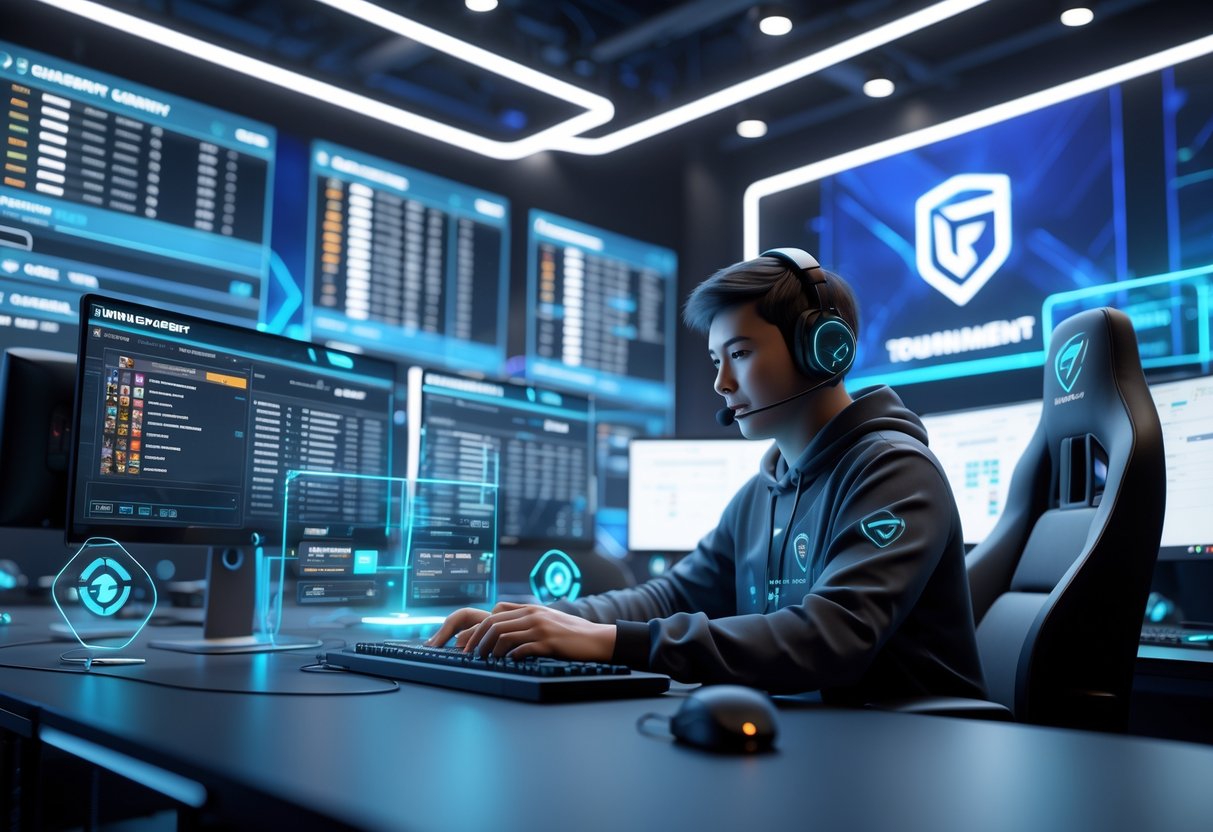
Tournament admins juggle three main duties to keep gaming events on track. They coordinate all the moving parts, enforce rules, and jump in to resolve disputes when things get messy.
Coordinating Tournaments
Tournament management means keeping a lot of balls in the air. Admins handle registrations, build match schedules, and set up tournament brackets on platforms like Battlefy or Challonge.
Before the event, admins test servers, work with venue staff, and make sure all the gear works. They chase up teams to confirm who’s actually showing up and share details about timing.
During the event, admins keep things moving and work with referees, sponsors, and production teams to avoid delays.
Key coordination responsibilities:
- Managing registration systems
- Creating and updating schedules
- Setting up scoreboards and displays
- Testing equipment and servers
- Explaining procedures to players and teams
Problem-solving comes in handy when tech issues pop up mid-tournament. Admins need to spot problems fast and fix them so the show can go on.
Rule Enforcement
Competition admins act as the referees in esports. They make sure everyone sticks to the rules.
Good rule enforcement starts with clear communication. Admins explain the rules before matches and watch for violations as games unfold.
Common enforcement duties:
- Recording match results accurately
- Watching for rule breaks
- Handing out warnings and penalties
- Checking player eligibility and roster changes
- Making sure fair play happens
Admins have to keep up with patches and updates. Every change can affect how the game’s played, so rules sometimes need tweaks.
Staying impartial matters. Even if you like a certain team, you can’t let that sway your calls.
Resolving Disputes
Handling disputes puts an admin’s communication and calm to the test. Admins deal with everything from small rule questions to big calls like disqualifications.
Typical disputes include:
- Technical problems that mess up gameplay
- Cheating accusations or bad behavior
- Arguments over match results
- Equipment failures at key moments
- Roster or substitution conflicts
Admins need to stay cool and professional, especially when delivering tough decisions. They gather the facts, check the rulebook, and make fair calls to keep the tournament on track.
Documenting everything is a must. Recording incidents and decisions keeps things transparent if someone appeals.
Quick resolutions keep the event moving and avoid holding up other matches. The best admins calm things down and explain their reasoning, so everyone gets why a decision happened.
Essential Skills for Success
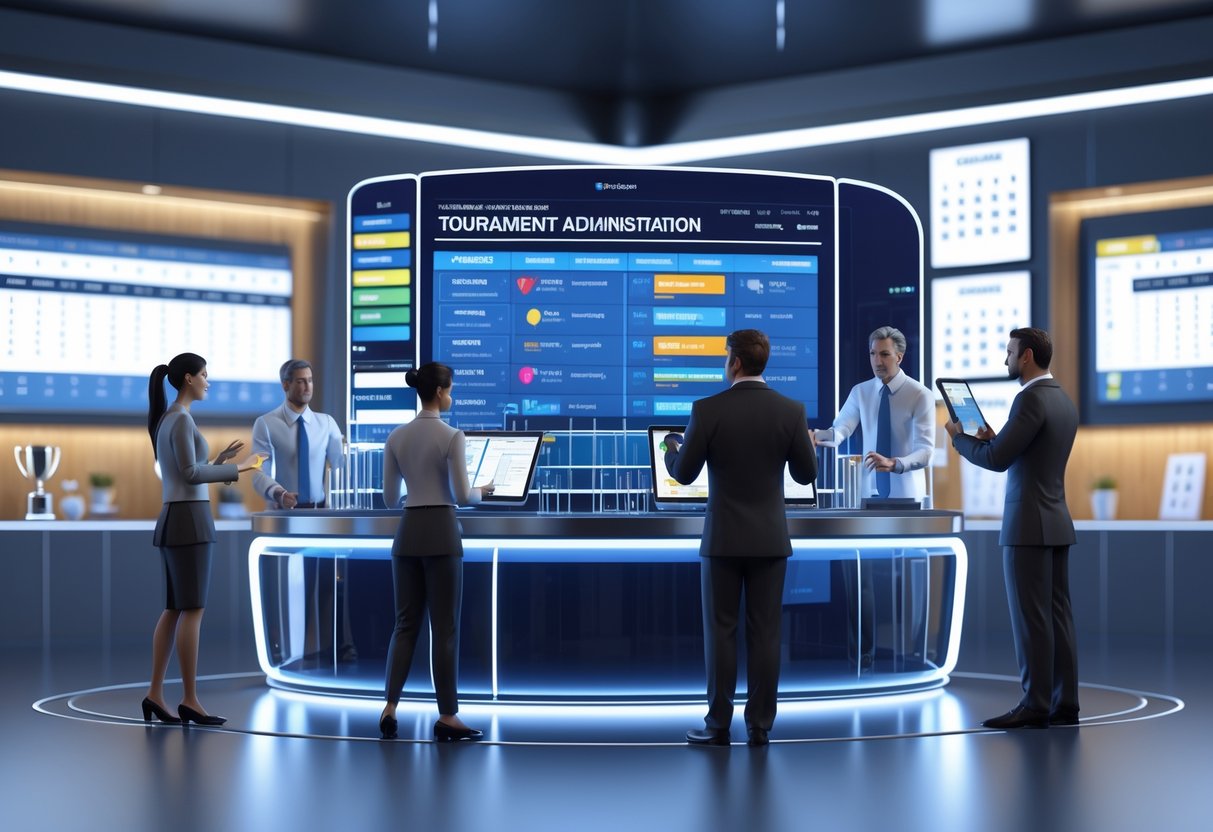
Tournament admins really need three things: strong communication, solid organisational skills, and the ability to solve problems under pressure. Good communication keeps everyone—from players to sponsors—in sync, while organisation makes sure nothing falls through the cracks.
Communication in Esports
Clear communication is everything in tournament admin work. Admins talk to pro players, team managers, sponsors, broadcast crews, and tech staff.
Key communication responsibilities:
- Briefing players on rules and changes
- Coordinating with production about stream delays
- Managing sponsor expectations
- Settling conflicts between teams
Admins often act as the go-to person when something goes wrong. Players might challenge a decision, and sponsors want updates on viewership.
Main communication channels:
- Discord for player coordination
- Slack for staff
- Email for sponsors
- Headsets during broadcasts
Tournaments move fast, so admins have to explain complex stuff in plain language, especially to sponsors who might not game themselves.
Listening matters too. Players under pressure might not explain problems well, so admins learn to read between the lines.
Organisational Abilities
Admins manage a lot at once—player schedules, tech setups, broadcast timing, sponsor stuff, and more, sometimes across different time zones.
Key organisational tasks:
- Building detailed brackets with backups
- Scheduling interviews around matches
- Arranging equipment deliveries
- Assigning referees for each game
Digital tools help keep everything in order. Spreadsheets track check-ins, and project management apps keep timelines clear.
Common organisational challenges:
| Challenge | Solution |
|---|---|
| Player visa delays | Keep backup players ready |
| Equipment failures | Have spare gear on site |
| Stream issues | Test all setups ahead of time |
| Sponsor conflicts | Map out venue spaces early |
Admins start planning months in advance. Even small mistakes can cause big headaches on event day.
Time management becomes key as things ramp up. Balancing long-term planning with last-minute fixes is just part of the job.
Problem-Solving in High-Pressure Environments
Live esports events can get stressful, and admins need to think fast. Technical failures, player disputes, and broadcast hiccups happen while thousands watch online.
Common high-pressure scenarios:
- Server crashes during big matches
- Players arriving late because of travel
- Sponsor equipment breaking during breaks
- Referee disagreements over rules
The show doesn’t stop for problems. Admins figure out fixes that keep things moving and don’t mess with fairness.
Problem-solving approach:
- Stay calm—panic spreads fast
- Get the facts—know what’s really wrong
- Consider options—work within the rules
- Communicate—let everyone know what’s happening
Contingency plans save the day. Backup servers, substitute players, and alternate venues are a must.
With experience, admins start spotting problems before they blow up. The veterans just know when something’s off.
Quick tip: Want to get better at this? Volunteer at local gaming events. Smaller tournaments are perfect for learning without too much pressure.
Qualifications and Career Pathways

Getting into tournament admin work takes a mix of hands-on experience, some education, and a real understanding of esports. Most admins blend traditional event skills with a feel for the gaming world.
Relevant Experience
Event management is the backbone here. You don’t have to start in esports—plenty of admins come from sports, corporate events, or conference backgrounds.
Experience that helps:
- Live event coordination
- Customer service under pressure
- Project management with tight deadlines
- Team leadership and wrangling volunteers
Getting involved in gaming communities is huge. Lots of admins start as players, streamers, or moderators. That grassroots experience really helps you get what players need.
How to get experience:
- Volunteer at local gaming events or LANs
- Run tournaments for your uni or club
- Help moderate online communities
- Lend a hand at charity gaming marathons
Educational Background
You don’t need a specific degree, but some paths line up well. Business, communications, and hospitality all teach useful stuff.
Degrees to consider:
- Event Management—straightforward and practical
- Business Administration—good for logistics and planning
- Sports Management—lots of crossover
- Digital Media—useful for streaming and broadcasts
Most admins have at least GCSEs in Maths and English. Some employers want A-levels or similar, especially for higher-up roles.
Other ways to learn:
- Event management apprenticeships
- Online project management courses
- Hospitality or tourism qualifications
- Gaming industry-specific programs
Certifications and Training in Esports
Certifications show you’re serious and know your stuff. More and more groups offer esports-specific training now.
Certifications that help:
- Project Management Professional (PMP)
- Certified Meeting Professional (CMP)
- Google Analytics—for tracking audiences
- First Aid/Health & Safety—always good for live events
You can find esports-focused training from gaming groups and some schools. These cover things like anti-cheat systems, player welfare, and how to work with broadcasts.
Where to find esports training:
- British Esports Association courses
- University esports programs
- Online platforms like Coursera or Udemy
- Industry conferences and workshops
Admins keep learning, too. Attending events, networking, and staying up to date with new tech and trends is just part of the job.
Pathways to Becoming a Tournament Admin
Most tournament admins get their start by volunteering at smaller events and slowly building connections in the esports world.
You really need that hands-on experience, plus relationships with tournament organisers who might offer you future gigs.
Volunteering and Entry-Level Roles
Jump into local events to get your feet wet.
Small LAN tournaments and uni competitions are always looking for extra hands.
These smaller events teach you the ropes, and honestly, the pressure isn’t that bad.
Tournament organisers usually need volunteers for bigger events, too.
The larger the tournament, the more admins they want on deck.
That means opportunities pop up all year round.
Look for junior roles at esports companies.
These positions rarely need tons of experience but do offer training.
Check job boards regularly and don’t be shy—reach out to organisers directly.
Great places to volunteer:
- Local gaming cafés with weekly events
- Uni esports societies
- Regional qualifiers
- Online platforms like Battlefy
Any experience, even just a weekend at a small Counter-Strike event, adds to your CV.
You never know where that first gig might take you.
Networking and Industry Connections
Build relationships with other admins and staff.
Esports runs on word-of-mouth, especially when it comes to hiring.
Admins are usually open to questions and happy to share what they’ve learned.
Most of them started as volunteers, just like you.
Ways to connect:
- Discord servers for organisers
- LinkedIn groups about esports jobs
- Industry events and gaming conventions
- Social media, where admins often share stories
Stay visible by showing up and being the person who solves problems fast.
Organisers notice admins who keep their cool under pressure.
James Connolly once said, “The best admins I’ve worked with all started by simply showing up consistently and being helpful. The esports industry is smaller than people think, so your reputation travels fast.”
Popular Esports Tournament Platforms
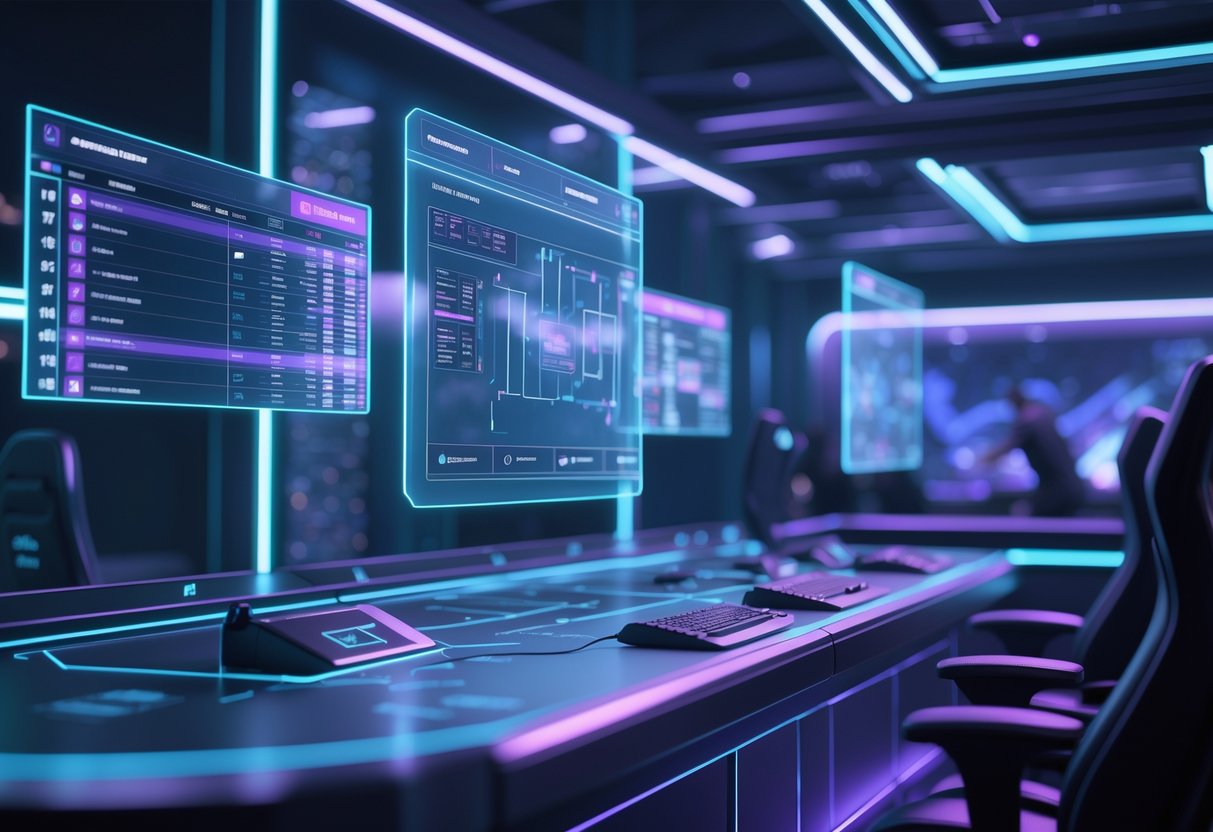
These days, tournament admins lean on specialised platforms for everything—player signups, brackets, scorekeeping, you name it.
Manual spreadsheets? Those are mostly gone, replaced by automated systems that track scores, handle payments, and keep everyone in the loop.
Battlefy for Tournament Management
Battlefy really stands out as one of the most comprehensive esports tournament platforms right now.
I’ve watched it handle everything from tiny community events to massive, high-stakes tournaments.
The platform makes life easier by managing gaming IDs and building tournament trees automatically.
You can set up single-elimination, double-elimination, or round-robin brackets—no need for calculator gymnastics.
Registration is a breeze—players sign up through the site, and you can set limits or skill requirements.
Key Battlefy features:
- Automated bracket generation and updates
- Prize pool tracking
- Real-time score reporting
- Team management tools
- Integration with games like League of Legends and Counter-Strike
It charges fees for big tournaments, but smaller community events can use it for free.
Most admins love the auto-updating rankings—no more endless questions about standings.
Other Leading Tools and Software
Other platforms also cover different needs really well.
Toornament offers great customisation and handles complicated, multi-stage brackets.
A lot of European organisers pick it for its flexibility.
RUSH.GG is all about competitive gaming, with anti-cheat tools and deep player stats.
Challonge? It’s probably the easiest for quick, local events or just testing out a format.
Popular alternatives:
- Toornament – Best for complex multi-game events
- RUSH.GG – Strong anti-cheat and stats
- Challonge – Dead simple brackets
- PlayVS – Aimed at school and college esports
Digital tools save admins from headaches like manual score tracking and endless questions.
Pick your platform based on your tournament’s size, the game, and how techy you feel.
Day-to-Day Operations of a Tournament Admin
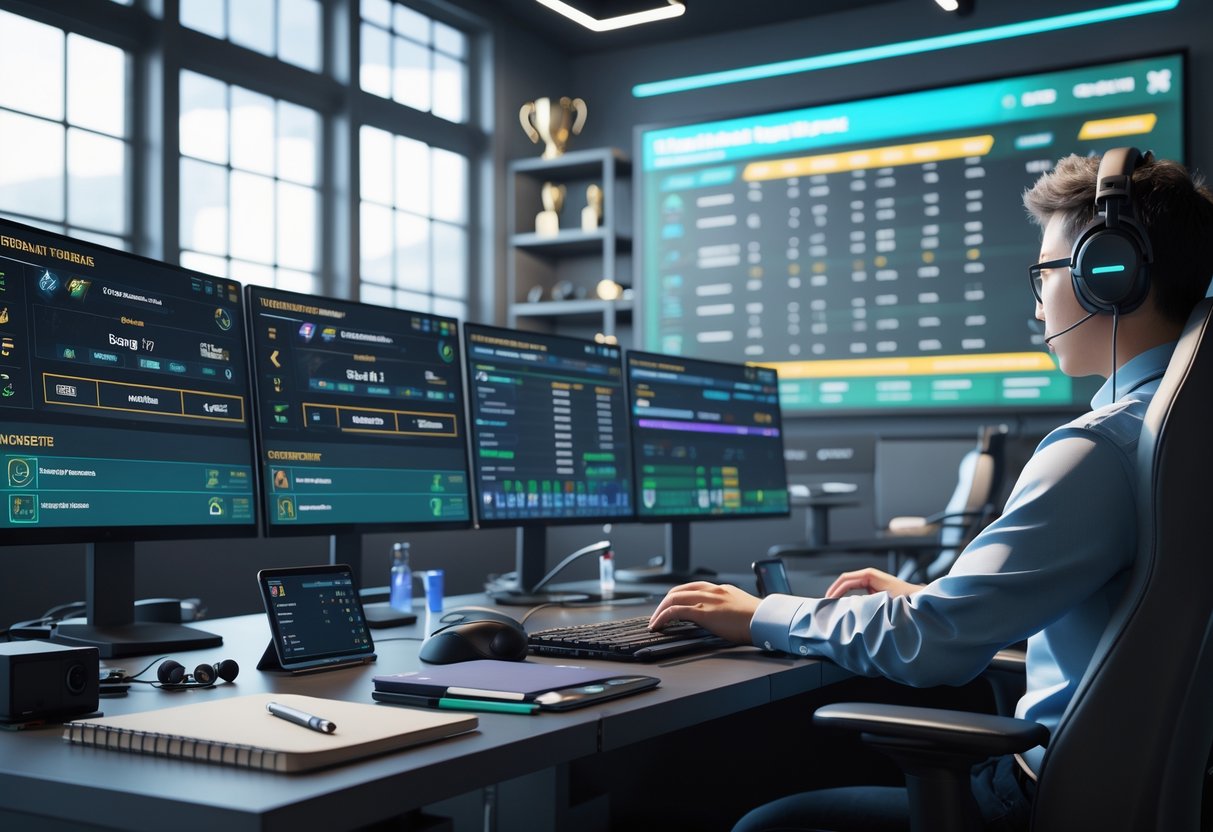
Tournament admins juggle two main things: building match schedules and brackets, plus keeping in constant touch with players and teams.
Scheduling and Bracket Management
Tournament management kicks off with making match schedules that work across time zones.
We set up brackets on Battlefy or Challonge, making sure to consider when players are free and where servers are located.
Daily scheduling tasks:
- Update match times if teams ask
- Move fixtures around when tech issues pop up
- Check server status before matches
- Coordinate with broadcast teams
We keep an eye on bracket progress all the time during live events.
If matches run long or there’s an upset, we adjust the next rounds to keep things moving.
Quick tip: Learn the basic formats—single elimination, double elimination, Swiss—since each needs its own approach.
The hardest part? Handling schedule conflicts.
Teams often have players in multiple events, so we negotiate new times that work for everyone.
Handling Player and Team Communication
Communication skills really matter when you’re managing a crowd of teams.
We use Discord, email, and platform chat to keep everyone up-to-date on rules and matches.
Typical daily communications:
- Send match reminders half an hour before games
- Sort out disputes over rules
- Coordinate technical pauses
- Update rosters when teams make changes
We run into frustrated players all the time, especially when tech problems mess with their matches.
Staying calm and professional keeps little issues from blowing up.
Heads up: Don’t promise rule changes until you check with head admins—consistency is key.
Esports moves fast, so we document every decision in shared sheets that other admins can see right away.
Technology and Tools Used by Tournament Admins
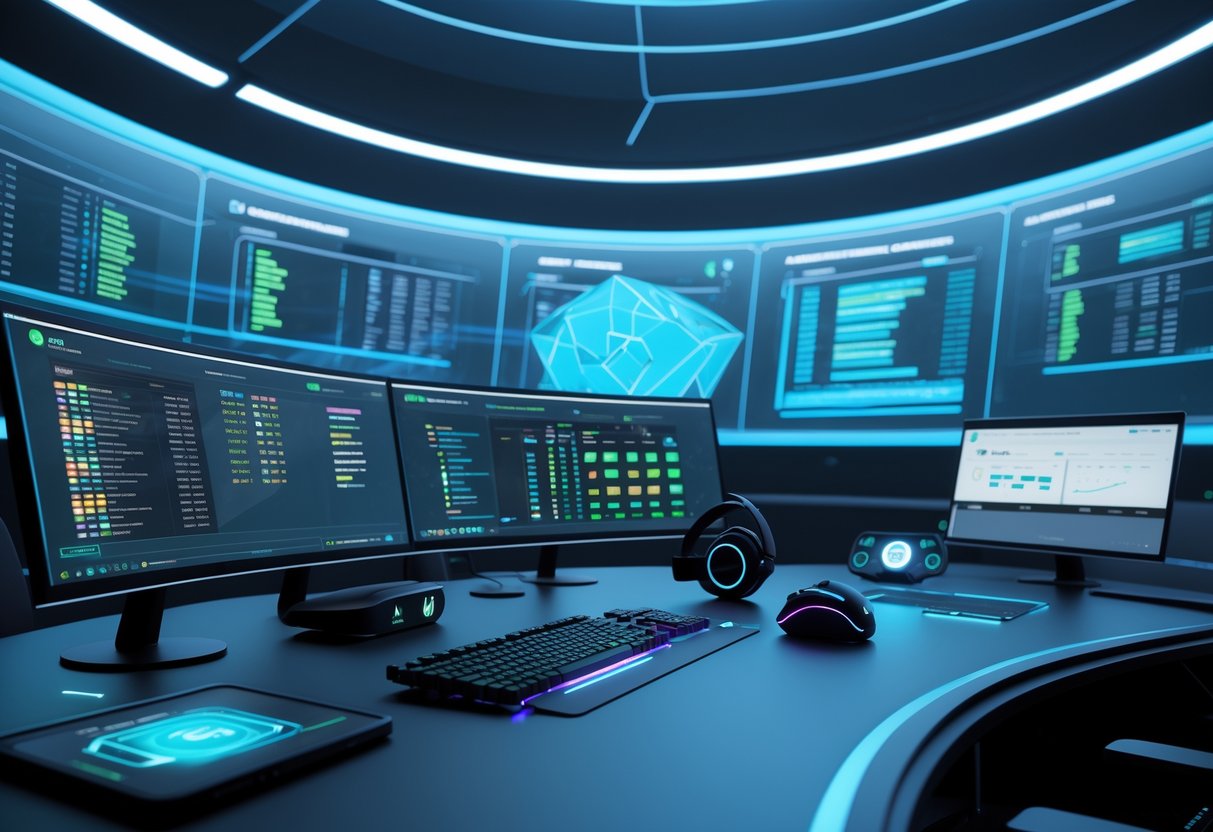
Admins lean hard on specialised software to manage brackets, track scores, and talk to teams.
These digital tools include full-featured admin panels, analytics dashboards, and API integrations that take care of the boring stuff.
Admin Panels and Dashboards
Admin panels are basically the tournament nerve center.
Platforms like Battlefy and Challonge give us dashboards to create brackets, update results, and watch progress live.
Most panels have team management built in.
We can invite teams, check registrations, and keep participant info in one place.
Quick chat tools let us send announcements or settle disputes without jumping between apps.
Modern dashboards show live brackets that update as soon as results come in.
Winning teams move on automatically—no more hand-editing brackets.
Heads up: Free platforms usually limit admin features, while paid versions unlock better scheduling and branding.
Popular admin panel features:
- Real-time bracket management
- Team registration tracking
- Match scheduling tools
- Rule enforcement
- Dispute workflows
Analytics and Reporting Features
Tournament analytics give us a look at trends and help us spot what needs fixing.
Most platforms spit out reports on match completion, average game times, and team stats.
Participation analytics show which times work best for different regions.
We use this data to plan future events.
Dropout analysis tells us when teams are most likely to bail, so we can communicate better.
Performance reports track player stats across tournaments, which helps with seeding and spotting rising stars.
Advanced dashboards let us filter by game, skill, or region.
Export features help us share summaries with sponsors or leagues.
Key analytics features:
- Match completion tracking
- Player stats
- Attendance patterns
- Tech issue logs
- Prize distribution
API Integration and Automation
APIs connect tournament platforms with game servers and streaming tools.
This setup pulls match results straight from games like League of Legends or Counter-Strike.
Automation handles routine stuff—reminder emails, social updates, bracket generation—without us lifting a finger.
Discord bots update channels with match results and upcoming games.
Custom integrations link tournament software to broadcast tools.
Stream overlays update with scores and player info, making broadcasts look pro without manual edits.
Quick tip: Start simple with Discord announcements before diving into streaming overlays.
Common automation tools:
- Importing match results
- Social media updates
- Email notifications
- Stream overlay management
- Prize pool calculations
Challenges and Problem-Solving Techniques

Admins run into daily headaches—technical failures, player disputes, you name it.
Quick problem-solving keeps things running.
Common Issues During Tournaments
Tech problems are probably the biggest pain.
Server crashes, internet drops, and gear failures can halt matches fast.
Connection issues:
- Players disconnect mid-game
- Streams drop at the worst times
- Team voice chat dies
Scheduling problems:
- Teams show up late or miss matches
- Time zone mix-ups in online events
- Matches go over time
Player disputes are another headache.
Arguments over rules, cheating accusations, and protest decisions all need quick answers.
Participant dropouts pop up with no warning.
Teams bail last minute, so we scramble to fix brackets.
Budget surprises force tough calls.
Equipment rentals go over budget, or sponsors back out days before the event.
Admins who handle these best keep backup gear ready, communicate clearly, and have substitute teams on call.
Conflict Resolution Strategies
Listen before you judge—let both sides talk it out before making a call.
That alone can stop small arguments from exploding.
Document everything during disputes.
Screenshots, replays, and written statements help you make fair decisions.
Set clear rules up front and explain them to players.
Teams can’t argue if they agreed to the rules already.
Use neutral language when delivering decisions.
Say “the ruling stands” instead of “you’re wrong,” so no one feels attacked.
Always have backup plans:
- Emergency contacts for staff
- Alternative venues if tech fails
- Extra refs for tricky matches
Make decisions quickly—delays annoy players and viewers.
Do your best with the info you have, then move forward.
Advancing as a Tournament Admin

If you want to move up in tournament administration, you’ll need to build trust and show you can handle bigger events.
Consistent performance and expanding your skills matter most.
Building Your Reputation
Your reputation starts with nailing the small events.
Every successful tournament boosts your credibility.
Start at local tournaments and learn the basics.
Volunteer at gaming cafés or uni events.
Smaller venues let you make mistakes without huge consequences.
Keep records of every event—participant numbers, tech problems solved, positive feedback.
That portfolio opens doors for bigger gigs.
Network actively with other admins.
Jump into Discord servers, follow established admins online, and actually chat with them.
Build relationships with players, teams, and staff.
Good admins remember what players like and treat everyone fairly.
Word travels fast in esports.
Specialise in a specific game at first.
Being the go-to admin for one title builds your expertise before you branch out.
Progressing to Senior Roles
Senior tournament admin roles mean you’ll manage teams and make big technical decisions. You’ll often work directly with sponsors and broadcast crews.
If you want to move up, start developing leadership skills by training new volunteers. Organisations usually promote admins who teach others well. Try explaining rules simply and keep your cool when things get tense.
Get familiar with broadcast coordination and sponsor management basics. Senior admins talk with streaming teams and make sure sponsors get what they expect during events.
Look into certifications for event management or platforms like Battlefy or Matcherino. These show employers you’re serious about your career.
Companies like ESL and Riot Games prefer to promote from within. You’ll have better luck applying for junior roles at established orgs than jumping straight to the top.
You might also want to try freelancing for several organisations. That way, you’ll build your network and pick up experience with different games and event types.
Analytics and Evaluations in Tournament Administration

We rely on data collection and participant feedback to keep tournaments improving. These tools help us catch problems early and make the experience better for everyone.
Using Data to Improve Tournaments
Tournament admins track analytics during events. I watch registration rates, match times, and tech issues to spot bottlenecks.
Essential metrics to track:
- Average match duration
- Number of technical delays
- Player drop-out rates
- Stream viewership numbers
- Discord activity levels
Modern platforms gather this data automatically. I can see which parts of a tournament cause the most delays or confusion.
Quick win: Set up automated reports for real-time metrics. This helps us fix issues as they happen, not after the fact.
Many admins use spreadsheets to track patterns across events. I compare data from different tournaments to catch trends or seasonal shifts.
The best insights come from combining data. Stream numbers plus player feedback usually explain why some matches do better than others.
Feedback Collection from Participants
Player feedback tells us what numbers can’t. I collect responses right after matches and at the end of tournaments to get honest opinions.
Effective feedback methods:
- Short post-match surveys (just 2-3 questions)
- Discord polls during breaks
- Email questionnaires within 24 hours
- Brief interviews with players who got eliminated
I ask specific things about tech issues, rule clarity, and how responsive admins were. Vague questions like “how was your experience?” don’t help much.
Heads up: Don’t bombard players with long surveys. If it takes more than two minutes, most will just skip it.
Smart admins reuse feedback templates across events. I track common complaints and suggestions to decide what to fix for next time.
The most helpful feedback usually comes from players who ran into trouble. I follow up with anyone who reported problems to find out exactly what happened.
Future Trends in the Tournament Admin Path

The tournament admin path just keeps growing as esports explodes and technology changes how we run competitions. New specialist roles are popping up, and automation keeps opening doors for skilled admins.
Growth of the Esports Industry
The esports tournament management platform market is on a tear. It hit £360 million in 2024, and some say it’ll reach £1.2 billion by 2033.
This boom means more admin jobs at every level. I see openings in regional leagues, university events, and even international championships.
Key growth areas:
- Mobile esports tournaments
- Amateur and grassroots competitions
- Corporate esports events
- School and university leagues
Tournament admins now deal with bigger prize pools and more complicated events. Some tournaments hand out millions, so admins need to know financial rules and even international law.
With more online tournaments, admins need solid digital skills. We run virtual brackets, coordinate remote teams, and sort out tech issues across time zones.
Emerging Roles and Specialisations
Modern tournament admin work splits into several specialties. Head Tournament Admins oversee whole events and lead teams of junior admins.
New tech-focused roles manage platforms. These admins handle tournament software, automated scheduling, and real-time data.
Specialised admin roles:
- Platform Specialists – run tournament software and automation
- Compliance Administrators – handle rules and player eligibility
- Regional Coordinators – manage tournaments in one area
- Educational Esports Admins – focus on school and university events
Communication matters more than ever. Tournament admins now work with production teams, sponsors, and broadcasters—not just players.
Data analysis helps a lot, too. Admins track player stats, engagement, and efficiency to improve future events.
Frequently Asked Questions

Tournament admins run into a lot of the same issues—setting up systems, managing teams, and keeping things fair. Here’s how I usually tackle the most common concerns: account setup, team sign-ups, match scheduling, communication, disputes, and rule enforcement.
How can I set up an account to manage my sports tourney?
I recommend starting with tournament platforms like Battlefy or Challonge. Both let you create free accounts for registration, brackets, and tracking results.
Set up your admin profile first. Use a clear photo and write a detailed bio to help teams trust you. List your esports background and give contact info.
Next, set up your tournament structure. Pick single elimination, double elimination, or swiss. Set team size limits and registration deadlines before going live.
Always test features with dummy teams first. That way, we catch technical issues before real teams sign up.
What steps are needed for a team to enrol in a competition online?
Teams should have their info ready before registering. You’ll need a team name, player details, and proof of eligibility if needed.
Registration usually means creating team accounts. Each player enters their gaming IDs and contact info. Some events check skill level or region.
For paid events, teams handle payment next. Most sites take cards and PayPal. Free tournaments skip this step.
Teams get confirmation emails when they’re in. They’ll get the rules, schedule, and info on how to communicate.
Could you guide me through the process of scheduling matches for a tournament?
I always set time zones right in the platform settings first. This stops confusion for international players.
Figure out how long the tournament will take based on format and team count. Single elimination wraps up faster than swiss or round-robin.
Add buffer time between matches. Tech issues and delays are common, so I allow 15–30 extra minutes per round.
Share the schedule clearly with everyone. I send reminder emails a day before matches and always give a backup channel like Discord.
What are the best practices for communicating with teams during a tournament?
Set up several ways to communicate before the tournament starts. Discord works for real-time chat; email is better for official updates.
Make separate channels for different topics. Use general chat for news, private channels for admin talk, and DMs for sensitive stuff.
Keep your messages clear and professional. Avoid gaming slang when explaining rules or penalties. Teams should get the info without confusion.
Answer questions fast during live events. Slow replies frustrate teams and can really mess up the schedule.
How does one handle dispute resolution effectively in the midst of tournament play?
Document everything from the start. Take screenshots, save replays, and record rule breaks as they happen. This evidence matters later.
Hear both sides before deciding. Teams see things differently, so I get all the info I can.
Stick to the rules the whole way through. Playing favorites or changing standards causes bigger headaches than the original dispute.
Make decisions quickly during live events. Delays annoy participants and throw off the schedule. If a call is controversial, I review it after the match ends if needed.
Could you advise on how to ensure fair play and compliance with rules in a tourney setting?
Really, you’ve got to know the tournament rulebook inside out before the event even kicks off. If you don’t fully understand the rules yourself, how can you possibly enforce them?
Stay alert and actually watch the matches as they happen. Keep an eye out for banned strategies, unauthorised software, or players acting out of line.
Live observation usually catches most of the problems. It’s not perfect, but it’s still the best way to spot issues as they come up.
If you can, use anti-cheat software. A lot of platforms now work with game-specific detection tools that flag suspicious gameplay patterns.
Set up clear penalty structures before the tournament starts. Teams should know what happens if they break the rules—nobody likes surprises after the fact.








